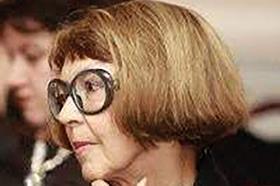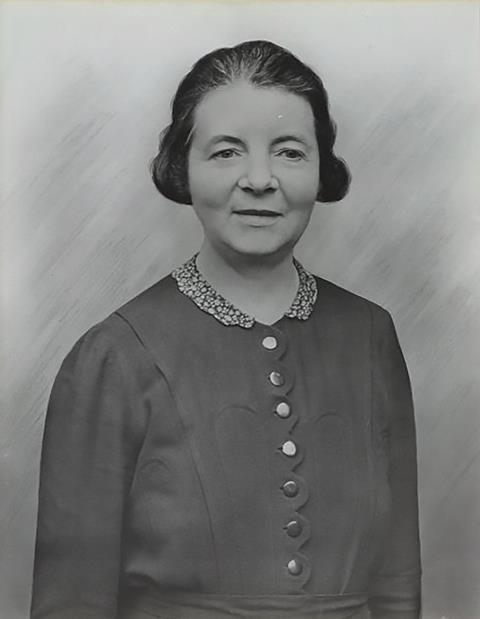In December 1922, 100 years ago to the month, Carrie Morrison became the first woman to qualify as a solicitor in England and Wales. In 1928 she became the first woman to address a Law Society provincial meeting and the first woman to take a divorce case under the Poor Persons Rules. She was regarded by her contemporaries as ‘the senior woman solicitor of England’.

Almost all the 100 women who qualified as solicitors by 1930 came from legal families. By contrast, Morrison’s background was relatively humble. One grandfather was a labourer and the other a Scottish innkeeper. Her mother was a cook, but her father rose over several decades from working as a lowly clerk for Tharsis, a Scottish mining company, to being a member of the London Metal Exchange.
Thomas Morrison’s business entailed lengthy sojourns in other countries. As his family travelled with him, Carrie had, by the age of 15, been around the world and educated in different schools in England, France and Spain. When in 1901 Thomas died in Barcelona, Carrie’s mother removed her, aged 12, and her sister Maggie, 10, to Hanover.
However, Germany’s growing militarism and chauvinism convinced Judith Morrison that her family should return to England, where Carrie attended Manchester High School for Girls from 1904-1907, and then Girton College, Cambridge, where she obtained First Class Honours in Medieval and Modern Languages.
In common with more than half her Girton cohort, Carrie became a teacher on graduation, but after four years’ teaching in Penarth and Putney, she concluded that she ‘hated it and that was not good for the children that I taught’. Her real ambition was to become a ‘political secretary’, but the first world war intervened.

In 1915, this ‘black-eyed and black-haired’ woman was recruited by MI5 and worked in the Ministry of Munitions and the Military Permit Office, where she processed the permit applications of those wishing to travel to war zones. Fortuitously, Alfred Baker, a partner in the firm of Kenneth Brown Baker Baker, was so impressed with her handling of his application that he offered her a position in his firm ‘after the war was over’.
But the end of the war saw her seconded to work in ‘general staff intelligence’ with the Army of the Black Sea in Constantinople, at that time a dangerous hotbed of revolution and social disturbance. Meanwhile, the Sex Disqualification (Removal) Act 1919 enabled Baker to offer her articles, for which he unusually waived the customary training premium and paid her a small salary. Carrie’s ‘essential war work’ in Constantinople operated to reduce the period of her articles to two years instead of three. She thus became ‘the first’ because her articles expired at the end of 1922, whereas those of the other three women who passed the finals with her in December 1922 did not expire until 1923. (I have identified no other woman solicitor able to claim this dispensation.)
Her undoubted intellectual ability enabled her to pass both the Law Society Intermediate and Final examinations within nine months of each other while simultaneously working full-time for Baker and supporting her mother and sister.
The prominent career predicted by friends and journalists was cruelly deferred by the ill-health and subsequent death of both her mother and her sister in 1924. Her mother died of cardiac failure; Maggie committed suicide by setting herself alight and jumping from a first-floor window of Carrie’s flat.
Once qualified, much of her professional efforts were directed to helping those less fortunate than herself. Volunteering as a ‘poor man’s lawyer’ at Toynbee Hall in London’s East End, Carrie met Ambrose Appelbe, a young solicitor with whom she entered into partnership in 1927 and married in 1929. She was 41; he was 26.
They had much in common. As well as building up their legal practice, they advocated substantial legal and social reforms, especially as they appertained to familial and marital relationships. In 1943 Carrie acted for Mrs Blackwell in her notoriously unsuccessful appeal against the decision that a husband had the right to any savings his wife might make from her housekeeping allowance. In her 1928 paper Courts of Domestic Relations, Carrie argued keenly for special and less intimidating courts for the resolution of family disputes.
She believed in equality between men and woman and, unusually, advocated that women must act fairly towards men. She acted for those in straitened circumstances, for East End prostitutes (‘those poor women’), and for those who demonstrated against the eviction of a war widow by the local council, praising the police in this case for their restraint and ‘sporting attitude’.
Even when she divorced Ambrose in 1937 on the grounds of adultery, Carrie continued to practise with him in Whitechapel and Lincoln’s Inn, much to the horror of her solicitor friend, Maud Crofts.
Carrie died in Broxbourne in February 1950 in the house she had lived in for almost 20 years. In a short letter to Girton College, her ex-husband wrote: ‘She was well-known in the Broxbourne area for her kindliness, sympathy and the legal advice she gave so freely in the evenings after work to those who were in need… She had the good hardy qualities of Highland Scottish ancestry on both sides, integrity, frankness and sincerity, with sympathy to all who were suffering.’
Elizabeth Cruickshank is a former chairwoman of the Association of Women Solicitors, was the first editor of Link, the magazine of the AWS, and is the author of Women in the Law































No comments yet